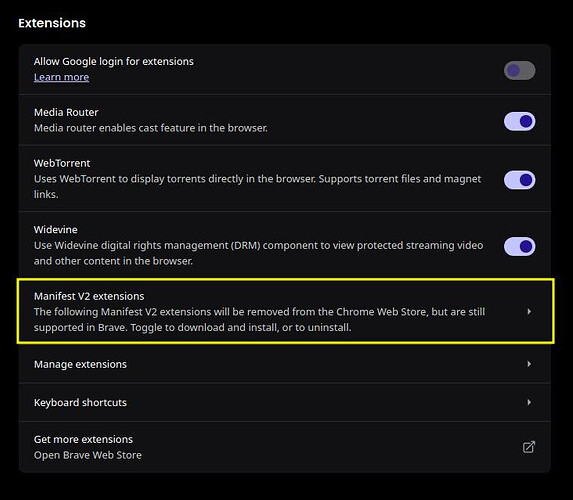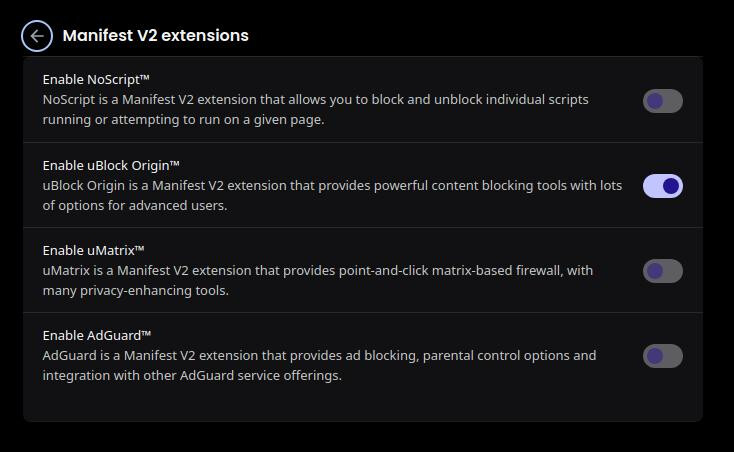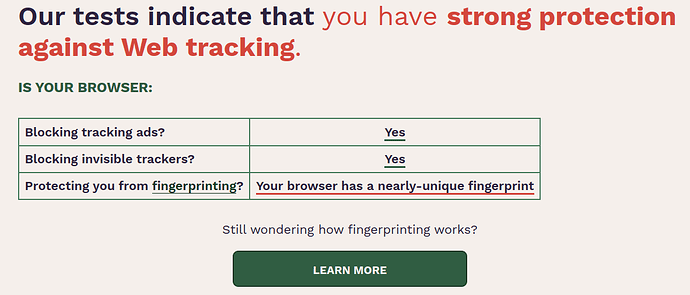Brave also allows you to reimplement uBO, among others.
Here is a more specific breakdown of what is missing from uBO Lite (from the Wikipedia page for uBO):
“uBO Lite differs significantly from uBO in several key aspects, primarily due to the constraints and design goals associated with MV3. Specifically, it lacks filter list updates outside of extension updates, and has no custom filters, strict-blocked pages, per-site switches, or dynamic filtering.”
The lack of filter list updates outside of extension updates handicaps how effectively uBO can respond when websites make changes regarding how content on a page is served. For a lot of websites this probably won’t be a big deal, but some sites are very proactive with making changes to defeat how effective adblockers can be. An example that most folks will be familiar with is YouTube; it is unlikely uBO Lite will be effective for blocking YouTube ads.
Strict-blocked pages allowed users to designate some URLs to be straight-up blocked. For example, if a user wants to block all Facebook trackers, they can add facebook.com (or specific subdomains like connect.facebook.net) to the strict-blocked list. This means that any requests to load content from Facebook will be blocked on all websites, effectively preventing Facebook from tracking the user across the web. Without this feature, users have an increased exposure to trackers and generally just less control over privacy.
Per-site switches allow users to enable or disable blocking on a site-by-site basis. This is useful for sites that may not function properly with ad-blocking enabled, or for sites that users want to financially support. uBO Lite users have to completely disable the entire extension to access these sites, or allow ads on sites they want to support. Keep in mind that when you disable the extension whole hog like this, all sites open in other tabs have free reign to load ads and trackers.
In my opinion it definitely does not, but of course each person’s specific use case and what benefit they get from uBO in the first place is relevant. I think folks who consume YouTube or certain social media content are likely to find uBO Lite cannot effectively block content without breaking the sites they are using.
Out of everything I do online, most of my time is spent on YouTube and I didn’t see any ad, on two different Chromium based browsers (standard Chromium and Vivaldi with the “Block Ads and Trackers” setting on). I’m sure it is more limited than uBO, but when it comes to not seeing ads, I personally didn’t have issues and that’s the main reason I use uBO.
EDIT: Maybe over time, things will change, but as it stands, I have no issues with uBOL on Chromium based browsers, so, yeah.
I’ve said it before, I’ll say it again… I’ve found that Librewolf is perfect for MY needs. Seems to have decent, common sense privacy/security settings, plus I install uBlock Origin. Fore me, that’s all I really need. I’ve been using Librewolf exclusively since Chromium based browsers disabled all Manifest V2 extensions, which includes uBlock Origin.
I think there is no such thing a total privacy. Determine who you’d like to be private from and then choose your options from that point of view ![]()
There’s always the It depends™.
I was going to post this site ![]()
I might use this one also. I don’t have a problem using an alternate browser other than Firefox. The reason is because I have a black czech shepherd that looks like a wolf. So you’d need to spruce up that icon for me and make the wolf black! ![]()
Edit: EOS Background purple with Black Wolf?
Here ya go, @ricklinux…
uBO Lite is just a shadow of its former self. Adguard (MV3 Beta) is even better (tested with Chromium).
Yeah, mozilla claims Firefox’s focus is privacy and security. Mozilla also spies on you through firefox.
So what you’re saying here is basically that the bank robber said his goal was to prevent the bank from being robbed; in return for a modest fee roughly the size of everything in the bank’s vault, taken with an adequate application of force. All very above board.
I was going to come and have a look if there were some nice new browsers I have not heard yet and that maybe I would like to give it a go.
Wow.
Just wow.
Okay, I did not read the whole thread, because that would have taken for about million years, but I just don’t get the fact that why some people have to get always so damn angry, when people don’t agree with them or share their concerns, actual or something else, whatever you want to call it.
I have never got this thing wrapped around my head that if someone doesn’t do something the way you like it to be done, that person is somehow deranged and has to be proven wrong in all and every aspect of his life.
Privacy is extremely important aspect of Internet. But does average user need in daily life something like VPN, because the fact is that if someone from <insert Big, Bad Corporation / Government / Bakery etc. here> wants to find out what you are doing on the Net, trust me, there are always ways to do it. And no, Tor is not the answer. Same applies there.
My point is, that everyone has their own standards of privacy and how they want to handle it. I am writing this on Chrome and I fully get the fact that Google spies me. But you know what? It would be doing it anyway, because of smartphones. And cars. And kitchen appliances. And and and… List goes on and on.
It seems to be so, that the cost of having this digital society of ours is the fact that our identity is no longer secret.
Are you referring to Pocket, or PPA?
Any proof for that? Because if this is true, it will be huge and more people would know about it, yet searching about it, I get nothing of the sorts.
I had to look it up too (I don’t use Firefox).
Perhaps @rabcor was referring to Firefox’s telemetry data collection. I assembled this summary from Mozilla’s own Firefox privacy policy.
By default, Mozilla processes your Firefox personal data…
Firefox sends data about your interactions with Firefox to Mozilla:
- Your IP
- Number of open tabs
- Number of open windows
- Number of webpage visited
- Number and type of installed Firefox Add-ons
- Session length
- Firefox version and language
- Operating system
- Hardware configuration, memory
- Crash and error information including Firefox’s memory contents at the time of a crash, “which may contain data that identifies you or is otherwise sensitive to you”
- Active URL at the time of a crash
- Outcome of automated processes (like updates)
- “Safebrowsing, and activation” (what’s this?)
- The number of times Firefox suggests or displays specific content and interactions with that content.
- Detailed interaction data with Firefox Suggest, add-on recommendations, top sites, etc.
Search specific (Awesome Bar, Search Bar, new tab search):
- Interaction with Firefox search features and search partner referrals
- Number of searches per search partner
- Ad engagement (when, but not what)
- Category information about your search queries (given example, “sports, travel, food, etc”)
May be shared with Mozilla partners:
- Location data, such as country, region and county (but not IP)
- Keyword location search data (eg, a city name if specified in the search query)
- Firefox Suggest display times, position and clicks
- Basic information about unrecognised downloads to Google’s SafeBrowsing Service, including filename and URL.
If “Improve the Firefox Suggest Experience” is an active setting:
- Anything typed into the search bar can be sent to Mozilla and partners.
Source:
Worth noting for comparison sake, LibreWolf’s privacy policy. No summary necessary ![]()
Here it is in full:
One of the goals of LibreWolf is to remove the data collection and telemetry from Firefox, and thus we don’t collect any data from the user in the LibreWolf browser or on the LibreWolf website.
We can’t always assure that no data is sent from the browser to Mozilla or other third parties, but we try our best to achieve that. For that case, also check out the Firefox Privacy Notice.
This is damn good comparison. I like it. This is something I assumed I would find here.
When entering a thread like this I was not expecting this really odd attitude against everyone who doesn’t code ones own browser or something.
After all, it’s everyone’s own decision what browser to use and I think we all should respect that.
That is indeed exactly what I’m talking about, also they say it’s opt-out (e.g. u can disable the telemetry setting), but how reliable is that really?
Companies that have opt-out telemetry function, historically (as in from recent history) keep spying on you even when you opt out, it’s at least the case with google and microsoft products.
Basically, can’t trust opt-out telemetry. Ever. Their privacy policy says nothing about requiring your consent after all.
Hence, projects like librewolf. And ungoogled chromium. The two browsers I said are probably the best options available privacy wise.
I have to be devil’s advocate here and throw in a question, that what makes you think community projects and projects that come from the source-code of big company products are somewhat safer?
We don’t know, if they are selling telemetry or something else to advertisers. I don’t claim that this happens, but you place great trust to someone who is completely unknown to you when they are saying that their project is “privacy first”.
And this is completely hypothetical. Just an thought came to my mind.





